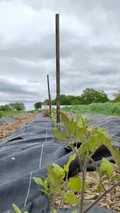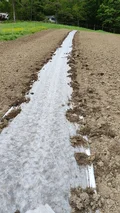TL;DR
We planted peppers, spread the last of the landscaping fabric, staked tomatoes, and celebrated our farmer’s birthday. It was a good day.
Preparing a Field for Peppers and Tomatoes
Before planting, we still had to spread the last of the landscape fabric for the season over some cultivated and hilled rows. On a windy day this is a bit of a challenge, but with proper communication and a little teamwork, we were able to get it done. Most of this was new fabric, but on many of the fields we have used fabric from previous seasons.
After making holes in the fabric we planted three rows of Carmen peppers which take about two to three months to mature, so the first of these will likely show up for CSA members in late July but more likely early August. Even though the soil had been recently cultivated, it took an honest amount of hand troweling to cultivate the hole and get the seelings planted.
Staking Tomatoes
The tomatoes we planted on Monday in the other field needed stakes so two of us went to where the composting shed is located on the other side of the pond and loaded about 100 stakes into the truck. Then we drove back over to the main field and staked the tomatoes already planted. The rest we dropped off at the newly landscaped rows. Three of these rows will be for the peppers and three for field cherry tomatoes.
We have yet to do the Florida weave with twine on the staked tomatoes but likely this will happen tomorrow or Friday since we don’t want floppy, thin young seedlings being whipped around by the wind gusts without support for long. There were only one or two of the taller seedlings that got kinked a bit and we always have extras to fill in gaps or failed seedlings so its not a big deal.
Celebrating Farmer’s Birthday
At lunch, the admin staff including Glen the owner and the groudskeeping crew joined us on Jamie’s deck for pizza and an ice cream cake. Another team member also brought homemade sushi so it was a really nice lunch. Despite knowing that Jamie is humble and it might be a bit awkward, I chanced it to say something nice about his approach to making space for learning and improvement in his field team and how he is a servant leader. It wasn’t awkward and I think he appreciated it.
Planting Peppers and Hand Fatigue
We finished the field day by planting three rows of peppers. I did one of them which wasn’t hard except that we’ve been planting daily for about a month now, and last week I was still learning the cons of not having the right gloves to protect my hands. I have a few blisters and my hands are sore, but there are ways around that too. Mostly I just need to have a variety of gloves for different tasks and be prepared to use them when necessary.
Short Day for Me
I had to leave early today because I have some family duties at the end of the school year, mostly chauffering but it’s nice to have a little time before showing up to a school function so that my nails aren’t embedded with dirt and my face is clean. It also gave me time to write this post so I don’t have to burn tonight’s candle or rush to do it in the morning like sometimes happens. SourceGraph Cody is also a bit of a help to speed some of the writing, but its more filler and I want to keep this writing tight to my own voice so that later use in LLM work has potent training data.
A Roadmap for My Personal LLM Work
I can’t wait to have a little time this Friday specifically devoted to containerizing and refining the templates on my LLM stuff. Hell, after that I might even get to implementing the RAG (Retrieval Augmented Generation) pipeline into the process.
I also want to standardize how these various workflows and services notify me…likely via my private Slack workspace in channels there; but for this, I’d like some sort of passive listener to various container logs to extract events rather than having to cobble together an events pub/sub backplane. Though logs-listening is an older two-hop hack, it a known and well traversed industry path. Modern observability practices encourage directly emitting specific events so that there’s no mapping, interpretation, or translation required…all of which incur overhead either of delay or cost. Maybe I’ll try both approaches and learn my own lessons, none of which an AI-driven answer can provide the confidence I’d like.
Beyond that, the plan is to automatically generate drafts of posts as unpublished commits to a separate branch than ‘main’…not the human color as above, but at least the file and its proper default front-matter. I’d also like to dabble with context aware LLM-based suggestions for tags and RAG-search keywords. This will fast-forward my process design thinking about what sequencing should occur because since using Cody last week, I’ve realized that pasting in the LLM-generated summary below into the blog post dramatically improves its suggestions as I type the humann-colored text.
For now, this is what the LLM produced based on my field notes:
Part 1
Main Themes:
- Hard work and physical labor
- Importance of preparation to reduce injury risk (e.g. “earning calluses”)
- Conclusion of daily tasks for the early day
Activities:
- Cleaning up the field
- Packing equipment into the truck
- Loading seedlings into two-inch pots
- Returning to the greenhouse with the loaded truck
New Things Not Yet Encountered:
None mentioned in this transcript.
Questions and Future Areas of Research:
The intern does not explicitly ask questions or mention future areas of research in this transcript. However, their comment “And that was the end of the early day” suggests they may be looking for more structure or variety in their workday.
Suggested Actions:
- Provide clear expectations for daily tasks and goals to help the intern stay on track and ensure a smooth workflow.
- Consider offering additional training or guidance on injury prevention techniques, such as proper lifting and handling of heavy equipment.
- Explore ways to add more structure or variety to the intern’s workday, such as introducing new projects or tasks that require different skills or expertise.
Part 2
Main Themes:
- Farm maintenance and upkeep
- Planting and harvesting
- Pest management (potato beetle damage)
- Irrigation (watering greenhouse and fields)
- Landscaping (covering fields with landscaping fabric)
Activities:
- Watered the greenhouse
- Brought out cherry tomatoes to harden off
- Helped cover a field with landscaping fabric
- Purchased tomato steaks (wooden posts) and installed them in the field
- Planted peppers in one of the fields
- Burnt holes into the new landscaping fabric
- Hand-weeded potatoes in a dry field
- Inspected potato plants for damage and eggs
- Covered an arugula bed with floating row cover
- Shoveled soil into the covered arugula bed
- Took a break for lunch
- Burned holes into new landscaping fabric
New Things Not Yet Encountered:
- Potato beetle eggs (bright orange dots on underside of leaves)
- Floating row cover (white)
- Pop-up market in Essex at the new general store
Questions and Future Areas of Research:
- “You have to figure out what has to happen immediately versus what can be dealt with later.” (This suggests that there may be trade-offs between different tasks and the intern is still learning about prioritization.)
- “How the population of potato beetles isn’t really that much of a factor this year” (The intern notes that there aren’t too many eggs, but it’s not clear what the implications are for future management.)
- “We didn’t put the tomato steaks up because that new field needed to be planted” (This suggests that the intern is still learning about the importance of timing and prioritization.)
Suggested Actions:
- Prioritize tasks based on urgency and importance
- Regularly inspect potato plants for damage and eggs to monitor beetle populations
- Consider using stirrup hose for hand-weeding potatoes in the future
- Plan ahead for upcoming events like the pop-up market to ensure adequate preparation and resources
[end of post]
Enjoy Reading This Article?
Here are some more articles you might like to read next:




